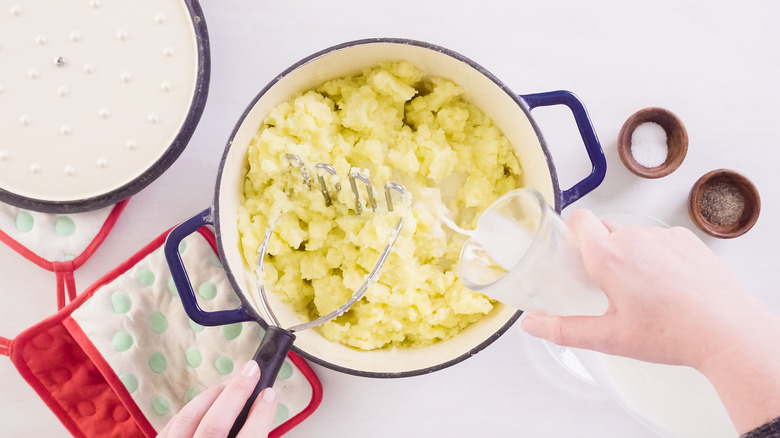Keep Frozen Mashed Potatoes Creamy With Extra Fat
There are plenty of ways to upgrade instant mashed potatoes, but we all know that the homemade version tastes better, not to mention that it also has a better texture. However, making homemade mashed potatoes can be a bit labor intensive, with the entire process often taking 30 minutes or more. Of course, this isn't always in the cards, but by batch-making and freezing the side, you can ensure that there will always be homemade mashed potatoes on the table. Still, you don't want to skimp on the fat if this is the route you choose. You'll want to (at least) double the amount of cream and butter you use in your pomme puree when you plan on freezing it to preserve the dish's creamy texture.
That may sound excessive, but without it, the liquid that the potatoes absorb during the cooking process will start to crystalize in the freezer, resulting in an off-putting grainy or mushy texture when reheated. The addition of extra fat essentially creates a protective layer that prevents that liquid from crystalizing, keeping your potatoes creamy and smooth until you're ready for another serving.
Even if you aren't meal-prepping and have leftover mashed potatoes after a big dinner, there is still a way to maintain the dish's creaminess in the freezer. Simply mix some additional butter and cream into the remaining spuds before you start prepping it for the freezer.
Other tips for freezing and reheating mashed potatoes
No matter how you make mashed potatoes for freezing, the first step is choosing the right ones. Starchy varieties, such as Idaho potatoes, russets, or Yukon golds, are best but not just because they yield a nice, fluffy texture. These potatoes also have a low moisture content, which makes them better for freezing. Mix in a tablespoon of white vinegar to prevent your potatoes from turning gray in the freezer.
When it comes time to pack up the side dish, make sure it's completely cooled. Then, you can either transfer the entire serving to a freezer-safe container or plastic bag (ensuring that there is no excess air to prevent freezer burn) or portion them individually by scooping the taters onto a parchment-lined baking tray, freezing, and then placing in a container.
Mashed potatoes can be stored in the freezer for up to 12 months, but if you notice a sour smell when reheating them, you should toss the entire stash in the garbage. Speaking of reheating mashed potatoes, you can do so on the stove by placing your spuds in a pan with a splash of cream or in the oven, microwave, or slow cooker.

